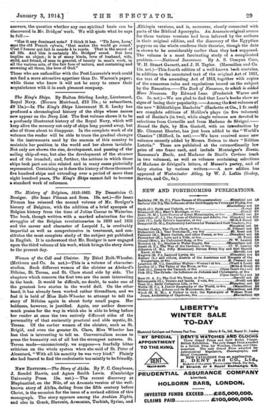Women of the Cell and Cloister. By Ethel Bolt-Wheeler. (Methuen
and (Jo. 5a. net)--This is a volume of character. studies. Such different women of the cloister as Abelard's Heloise, St. Teresa, and Bt. Clam stand side by side. The chapters which concern the first two are the most interesting in the book. It would be difficult, no doubt, to make one of the greatest love stories in the world dull. On the other hand, it has already been worked rather threadbare, and we feel it is bold of Miss Bolt-Wheeler to attempt to tell the 'dory of Heloise again in about forty small pages. Her boldness, however, is justified. Again, our author deserves much praise for the way in which she is able to bring before her reader at once the two entirely different sides of the personality of that eminently practical and able mystic, St. Teresa. Of the earlier women of the cloister, such as St. Brigid, and even the greater St, Clam, Miss Wheeler has less that is interesting to tell us. Conventualisin seems to press the humanity out of all but the strongest natures. St. Teresa made—unconsciously, we suppose—a fearfully bitter criticism on the whole system when she said of St. Peter of Alcantani, "With all his sanctity he was very kind." Plainly she had feared to find the ecclesiastic too saintly to be friendly.


















































 Previous page
Previous page